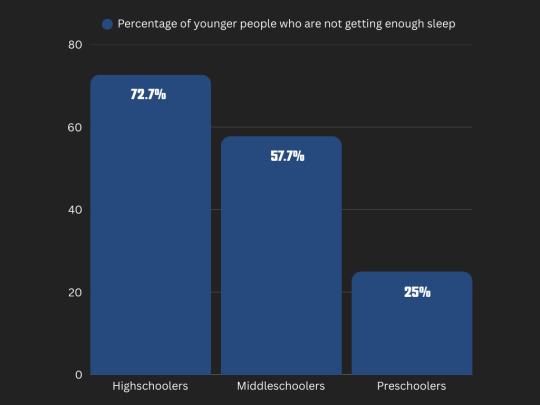Don't wanna be here? Send us removal request.
Text
How Insomnia Affects Kids
Insomnia is normally studied in adults, because of the severe side effects on the body and a person’s ; one big side-effect can be on memory. In adults, sleep is important to declarative memory because it helps with memory formation. It can cause even bigger issues if the insomnia disorder is continued (i.e. chronic insomnia) [1]. BUT: For kids declarative memory is ALSO heavily impacted by sleep. In a study on declarative memory (a) in children and adults, both groups were better at remembering things after sleeping that after trying to remember things after staying awake [2]. (A nap, a goodnights sleep etc. was all helpful for remembering).
Studies like this are interesting in a time where sleep has become so diminished in kids and even adults, because the effects on memory are actually pretty large.
On weekdays ~72.7% of highschoolers sleep less than the recommended 8 hours a night for this age group [3]
57.8% of middle schoolers sleep less than the recommended 9-12 hours of sleep a night for this age group [4].
Considering the amount of sleep kids are getting and how many of them have insomnia, this might be even more worrying.
In childhood ~30% of children have insomnia [5]; in adolescence 20-25% have insomnia [3].
What’s really crazy is that even younger than adolescence, even younger than childhood:
~25% of preschoolers have sleep issues, and ~16.6% have insomnia [6].
Kids at all ages can have insomnia and serious sleep issues. They are something to pay attention to, they will affect kids in all kinds of way.

GOOD NEWS: If you’re interested in learning about insomnia’s effects on declarative memory (or memory in general) right now there is a lot more research available on the topic than there was about 10 years ago. Especially concerning children/teenagers etc. there’s been more of a development on looking at this topic, and ways to help improve sleep for younger people specifically. Some Interesting Treatments at the moment:
Pharmaceutical Treatment (drugs/sleep meds): benzodiazepine and even non-benzodiazepine medications are pretty popular. They’re mainly for anxiety/insomnia, and normally used for adults (because these may cause issues with dependency, and potential abuse of medication, they are a last resort for children and adolescence).
Therapy: Cognitive Behavioral Therapy (CBT) – This is a kind of talk therapy, normally it’s pretty helpful if the insomnia is comorbid with something else like anxiety.
The current problem with treatment is that: insomnia treatment varies wildly from person to person; often once treatment ends of either pharmacological treatment or CBT, patients will relapse [7].
Hopefully research on the causes of insomnia in kids continues as well as research on treatments. Because of the impact on learning and memory specifically, it’s very worrying the amount of kids with insomnia and sleep issues, so many parents have been looking at options for treatment lately as people are more comfortable relying on psychiatric help. Insomnia is a big deal, it has a lot of negative effects, the more interest people show in getting help for it, the better the research will get. …
(a) Declarative Memory: Memory of facts and information– so for children/teenagers this could be, arithmetic, history, English, foreign language lessons, etc. [1] [2] [3] [4] [5] [6] [7]
2 notes
·
View notes